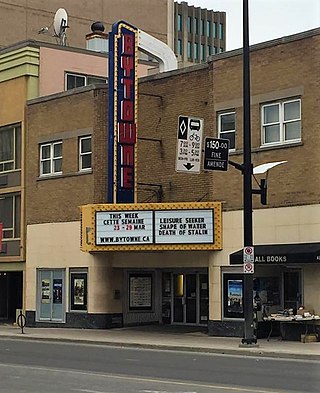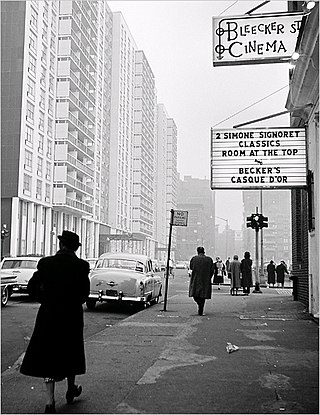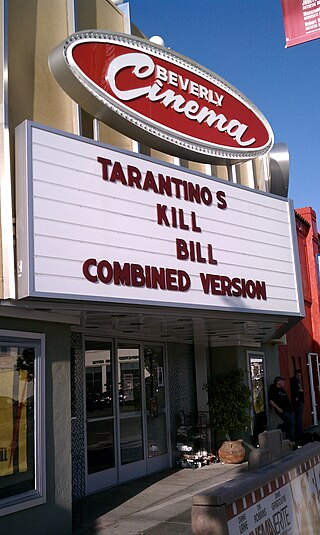
A movie theater, cinema, or cinema hall, also known as a movie house, picture house, picture theater or simply theater, is a business that contains auditoria for viewing films for public entertainment. Most are commercial operations catering to the general public, who attend by purchasing tickets.

The ByTowne Cinema is a one-screen repertory movie theatre located in Ottawa, Ontario, The cinema is one of Ottawa's main venues for independent and foreign films. The 650-seat cinema is located on Rideau Street at Nelson, several blocks east of the Rideau Centre. It was closed on December 24, 2020, with a final week of screenings shown on February 26 to March 7, 2021. The cinema reopened under new ownership on September 8, 2021.

Goodbye, Dragon Inn is a 2003 Taiwanese comedy-drama slow cinema film written and directed by Tsai Ming-liang about a movie theater about to close down and its final screening of the 1967 wuxia film Dragon Inn.
Landmark Theatres is a movie theatre chain founded in 1974 in the United States. It was formerly dedicated to exhibiting and marketing independent and foreign films. Landmark consists of 34 theatres with 176 screens in 24 markets. It is known for both its historic and newer, more modern theatres. Helmed by its President Kevin Holloway, Landmark Theatres is part of Cohen Media Group.

IFC Center is an art house movie theater in Greenwich Village, Manhattan, New York City. Located at 323 Sixth Avenue at West 3rd Street, it was formerly the Waverly Theater, an art house movie theater. IFC Center is owned by AMC Networks, the entertainment company that owns the cable channels AMC, BBC America, IFC, We TV and Sundance TV and the offshoot film company IFC Films.

The Seattle Cinerama Theatre is a landmark movie theater in the Belltown neighborhood of Seattle, Washington, United States. The theater opened in 1963 and was renovated in the 1990s after its acquisition by Paul Allen. The Cinerama was closed in May 2020. At the time of its 2020 closure, it was one of only three movie theaters in the world capable of showing three-panel Cinerama films. In 2023, the theater was purchased by the Seattle International Film Festival (SIFF) and reopened on December 14, 2023 as SIFF Cinema Downtown due to trademark issues with the "Cinerama" name.

The Bleecker Street Cinema was an art house movie theater located at 144 Bleecker Street in Manhattan, New York City, New York. It became a landmark of Greenwich Village and an influential venue for filmmakers and cinephiles through its screenings of foreign and independent films. It closed in 1990, reopened as a gay adult theater for a short time afterward, then again briefly showed art films until closing for good in 1991.

The Senator Theatre is a historic Art Deco movie theater on York Road in the Govans section of Baltimore, Maryland. It is the oldest operating movie theater in central Maryland and is listed on the National Register of Historic Places and is a designated Baltimore City Landmark.

The Alamo Drafthouse Cinema is an American cinema chain founded in 1997 in Austin, Texas, which is famous for serving dinner and drinks during the movie, as well as its strict policy of requiring its audiences to maintain proper cinema-going etiquette.

The New Beverly Cinema is a historic movie theater located in Los Angeles, California. Housed in a building that dates back to the 1920s, it is one of the oldest revival houses in the region. Since 2007, it has been owned by the filmmaker Quentin Tarantino.

The Quad Cinema is New York City's first small four-screen multiplex theater. Located at 34 West 13th Street in Greenwich Village, it was opened by entrepreneur Maurice Kanbar, along with his younger brother Elliott S. Kanbar in October 1972. It has been described as "one of the oldest independent cinemas in the city" and "a vibrant center for art house films."

Bruce Goldstein is a New York City based film programmer, distributor, documentarian, writer, producer, and publicist. He is best known for his work as the repertory programmer for Film Forum in New York. The magazine Time Out New York named him “one of the 101 essential people or places of New York,” citing him “for keeping showmanship alive.”

An outdoor cinema consists of a digital or analog movie projector, scaffolded construction or inflatable movie screen, and sound system.

The Paris Theater is a 535-seat single-screen art house movie theater, located in Manhattan in New York City. It opened on September 13, 1948. It often showed art films and foreign films in their original languages. Upon the 2016 closure of the Ziegfeld, the Paris became Manhattan's sole-surviving single-screen cinema. Since November 2019, it has been operated by Netflix, playing first-run releases alongside repertory programming.
The Patio Theater is a music venue and movie theater located at 6008 W. Irving Park Road on the northwest side of Chicago, Illinois in the Portage Park neighborhood. The building was built in 1927 as a movie theater. Chris Bauman took over the operations of Patio Theater in 2018 and became owner by the end of 2019.

Nitehawk Cinema is a dine-in independent movie theater in Brooklyn, New York City. It operates two locations, in the neighborhoods of Williamsburg and Park Slope. The theater, which offers a menu of food and drinks that can be ordered and consumed while patrons view films, was the first liquor licensed movie theater in the state of New York, and the first movie theater in New York City to offer table service.

The COVID-19 pandemic had a negative effect on certain films in the early 2020s, mirroring its impacts across all arts sectors. Across the world, and to varying degrees, cinemas and movie theaters were closed, festivals were cancelled or postponed, and film releases were moved to future dates or delayed indefinitely. Due to cinemas and movie theaters closing, the global box office dropped by billions of dollars, streaming saw a significant increase in popularity, and the stock of film exhibitors dropped dramatically. Many blockbusters originally scheduled to be released by mid-March 2020 were postponed or canceled around the world, with film productions also being halted. This in turn created openings for independent cinema productions to receive wider exposure.
Maximalist film or maximalist cinema is related to the art and philosophy of maximalism.
Minimalist cinema is related to the art and philosophy of minimalism.
















